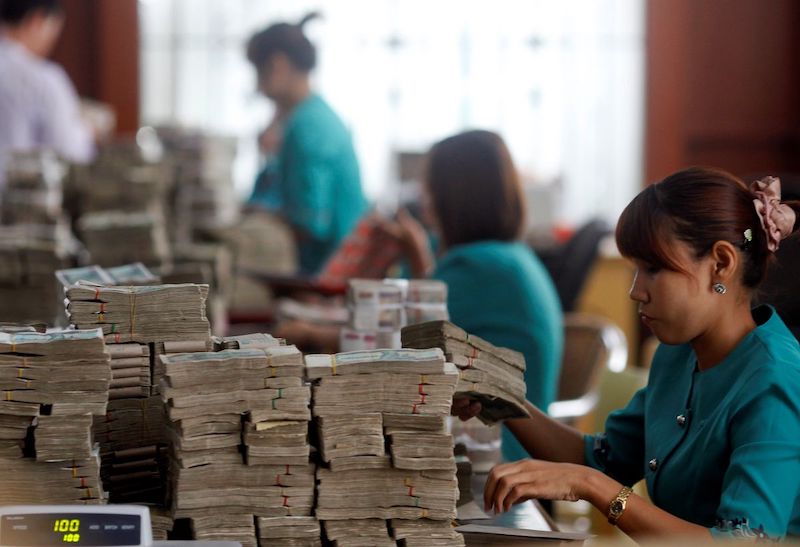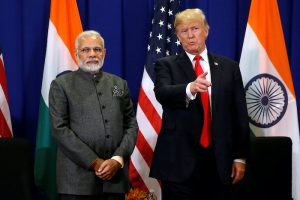Sonali Bank, a state-owned Bangladeshi bank that handles most bilateral trade with Myanmar, has frozen the accounts of two key Myanmar banks.
The move, revealed this week, followed a warning by the US embassy in Dhaka asking the government to adhere to sanctions imposed by the US Treasury on June 21.
Accounts of the Myanma Foreign Trade Bank (MFTB) and Myanma Investment and Commercial Bank (MICB), which hold deposits totalling about $1.1 million have been frozen, according to Sonali Bank’s CEO Afzal Karim.
The Myanmar banks act as foreign-currency exchange businesses and help state enterprises access to global markets via offshore accounts.
ALSO SEE: China Starts Military Drills Around Taiwan Over Lai’s US Visit
US move ‘aims to stop atrocities’
According to Benar News, the US embassy letter said the sanctions were imposed to prevent the Myanmar military regime “from purchasing arms that could be used to commit atrocities and other abuses”.
The Myanmar ambassador had met officials in Bangladesh in a bid to try to withdraw the money, but Dhaka denied the request, news reports said.
The US has leverage over Dhaka because it is Bangladesh’s largest export market. In 2021 the United States imported items – mainly clothing – totalling $8.7 billion.
Plus, Bangladesh does not do a huge amount of trade with its neighbour.
The Dhaka office of JPMorgan, the US multinational financial services conglomerate, also sent a letter to Sonali Bank, asking for information about its accounts in banks under sanctions across the world and the latest status of transactions with them, according to The Business Standard.
JPMorgan is a partner of Sonali Bank in various fields of international transactions, such as payment settlement and letters of credit confirmation, it said.
The moves in Bangladesh follow action by UOB, a key bank in Singapore, which said early this month it would cut ties with banks in Myanmar at the end of this month.
That news, revealed by Nikkei, was a huge win for anti-regime activists, given UOB is the biggest foreign bank in Myanmar, favoured by the military and its cronies, and city-state a key facilitator of funds for arms deals.
Irrawaddy, an exile news outlet, described the action by Bangladesh as a financial noose tightening on the Myanmar junta.
Top general upset about ‘weaponized dollar’
Myanmar’s Senior General, Min Aung Hlaing, complained about “weaponization of the dollar” in a video address on Tuesday to a conference in Moscow, which he said posed a threat to the financial systems and security of other nations.
The regime has been forced to use Chinese yuan and Russian roubles to buy fuel and other commodities, while the local currency continues to lose value.
The kyat, which was traded at 1,300 to 1,400 to the dollar before the coup, is now close to 4,000 to the dollar.
The regime is extremely unpopular both in and outside Myanmar, for destroying the country’s economy and its relentless brutality in prisons and many areas of conflict.
UN investigators said recently that war crimes committed by Myanmar’s military, such as the bombing and burning of civilian homes and buildings, had become “increasingly frequent and brazen”.
Call for safe zone along Thai border
Meanwhile, lawmakers in Thailand’s lower house have called for a safe zone to be set up alongside the Thai border in southeastern Myanmar as a refuge for people displaced in Kayah and Kayin states, who have been forced to flee frequent clashes between junta and rebel forces, RFA reported.
Kanawee Suebsaeng, an MP from Thailand’s Fair Party, suggested the zone be set up 5 kilometres into Myanmar from the border, adding that 300,000 displaced people were living near the border across from Chiang Rai, Chiang Mai, Mae Hong Son, Tak, Kanchanaburi and Ranong districts.
However, the likelihood of that occurring may depend on a vote in the Thai parliament next week to determine if a coalition headed by Pheu Thai party has the numbers to form a government.
One of the parties of that proposed coalition has members and supporters of Thailand’s former ex-military government, which had close ties with the Myanmar military.
If the ‘old guard’ win a share of power and secure the defence portfolio, they could determine whether the safe zone proposal is endorsed or opposed – and whether contentious ‘pushbacks’ continue.
Currently, 1.9 million people are displaced across Myanmar and in urgent need of lifesaving assistance and UN aid officials say that number is rising steadily.
- Jim Pollard
ALSO SEE:
UOB to Cut Ties With Myanmar Banks on Sept 1 – Nikkei
EU, US Sanctions Aim to Curb Funds for War in Myanmar
Crime Gangs Control Some Myanmar, Laos Economic Zones: UN
Myanmar Sets Up China-Made CCTVs in More Cities
Myanmar-China Traders Battered by Forex Rates, New Rules
























